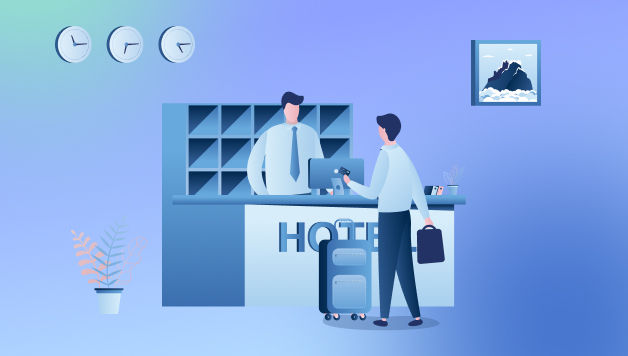How to Choose the Right Hospitality Management System
- Glorywebs Creatives

- Aug 12, 2025
- 5 min read
Updated: Dec 19, 2025

In today’s fast-paced hospitality industry, efficiency, accuracy, and customer satisfaction are key drivers of success. A Hospitality Management System plays a central role in helping hotels, resorts, and other lodging businesses streamline daily operations, manage reservations, track inventory, and deliver exceptional guest experiences. Choosing the right system isn’t just a technology decision—it’s a business strategy that can shape the future of your hospitality operations.
Finding the perfect match for your business requires understanding your needs, analyzing available options, and ensuring that the solution you choose will grow alongside your business. With the right approach, your system can become the backbone of your operations, empowering staff, reducing costs, and improving the guest journey.
Understanding Your Operational Needs
Before comparing vendors or features, it’s important to clearly define your property’s operational requirements. Start by mapping out your current processes—from booking and check-in to housekeeping and billing. Pinpoint inefficiencies, bottlenecks, and recurring errors that cause frustration for both guests and staff.
For example, smaller boutique hotels may need a lightweight, intuitive Hotel Management System with easy integration to online travel agencies (OTAs), while large resort chains might require robust, scalable Hotel Property Management Software with advanced reporting and analytics.
Consider the following questions:
Do you need multi-property capabilities?
Should the system integrate with your existing payment gateway or restaurant POS?
Will you require cloud-based access for remote management?
By answering these, you create a clear baseline for what features are non-negotiable.
Evaluating Cloud vs. On-Premise Solutions
One of the first decisions you’ll face is whether to choose a cloud-based or on-premise system. Cloud-based Hotel Property Management Software offers accessibility from anywhere, automatic updates, and lower upfront costs. It’s especially beneficial for properties with multiple locations or managers who travel frequently.
On the other hand, on-premise systems can offer more control over data security and may be suitable for businesses in areas with unreliable internet connectivity. The choice ultimately depends on your operational flexibility, budget, and IT resources.
Integration Capabilities
A great Hospitality Management System shouldn’t operate in isolation—it should seamlessly connect with other tools you already use. Integration capabilities are crucial for maintaining data accuracy and operational flow.
Your system should ideally sync with:
Online booking engines and OTAs
Payment processing systems
Customer relationship management (CRM) tools
Point-of-sale (POS) systems for restaurants, spas, and gift shops
Housekeeping and maintenance tracking systems
Integration eliminates the need for manual data entry, reducing the risk of errors and improving efficiency across departments.
Scalability for Future Growth
Even if your property is small today, your management system should be able to accommodate future growth. A scalable system allows you to add new features, integrate more third-party tools, and handle an increasing number of reservations as your business expands.
Look for vendors that offer modular upgrades or tiered pricing plans. This way, you can start with the basics and scale up when needed without having to migrate to an entirely new system.
User Experience and Staff Training
The best technology is only as good as the people using it. A complicated interface can frustrate staff, increase errors, and slow down operations. When choosing a system, consider:
Ease of navigation for different staff roles
Availability of multi-language support
Accessibility on mobile devices for housekeeping and maintenance teams
Many vendors offer training sessions, tutorials, and customer support. Ask whether training is included in the package or charged separately. A well-trained staff ensures you get maximum value from your investment.
Security and Compliance
Hospitality businesses handle sensitive customer data, including personal details and payment information. Your chosen system must comply with industry regulations such as PCI DSS for payment security and GDPR for data privacy (if applicable).
Security features to look for include:
Data encryption in transit and at rest
Regular backups
User access controls
Audit logs for tracking changes
Prioritizing security not only protects your guests but also safeguards your brand’s reputation.
Vendor Reputation and Support
When evaluating vendors, research their reputation in the hospitality industry. Look for reviews, testimonials, and case studies from similar businesses. Reliable customer support is essential—especially in hospitality, where downtime can quickly lead to lost revenue and unhappy guests.
Ask these key questions:
Is support available 24/7?
What is the average response time for technical issues?
Do they provide a dedicated account manager for your business?
Strong support ensures that any issues are resolved quickly, minimizing disruptions to your operations.
Cost Considerations and ROI
While budget is an important factor, the cheapest option is not always the best. Consider the total cost of ownership, which includes:
Initial setup or licensing fees
Monthly or annual subscription costs
Training expenses
Maintenance and upgrade fees
Compare these costs against the potential benefits, such as increased booking efficiency, reduced labor costs, and improved guest satisfaction. A well-chosen Hospitality Management System can deliver significant returns over time.
The Role of a Software Development Company
In some cases, off-the-shelf solutions may not meet your property’s specific needs. Partnering with a Software Development Company like Glorywebs can help you create a customized system tailored to your exact requirements. This option allows for unique feature sets, specialized integrations, and a design that perfectly matches your brand identity.
Leveraging AI and Emerging Technologies
Modern hospitality software increasingly incorporates AI automation to enhance guest experiences and operational efficiency. For instance, predictive analytics can help you anticipate peak booking periods, while chatbots can handle basic guest inquiries around the clock.
Some hotels even explore ChatGPT Development Services to create conversational AI assistants that offer personalized recommendations, assist with reservations, and handle multilingual communication—freeing up human staff for more complex tasks.
Final Decision-Making Tips
Before signing a contract, take advantage of free trials or demos offered by most vendors. Involve key team members in the evaluation process to gather feedback from different operational perspectives.
Checklist for the final selection:
Meets all must-have features identified earlier
Offers strong integration with existing systems
Scales to accommodate future growth
Provides an intuitive user experience and comprehensive training
Maintains high security and compliance standards
Backed by reliable vendor support
Delivers good value for the investment
Making a well-informed choice ensures your management system will become a long-term asset rather than a recurring headache.
Conclusion
Choosing the right Hospitality Management System is a strategic decision that can transform how your property operates. By carefully assessing your needs, evaluating integration capabilities, considering scalability, and ensuring strong vendor support, you can select a solution that boosts efficiency, enhances guest experiences, and supports sustainable growth.
In the competitive hospitality industry, the right technology doesn’t just keep you afloat—it helps you stand out. Whether you opt for a standard platform or a custom-built solution, the investment you make today will shape your success for years to come.





















Comments